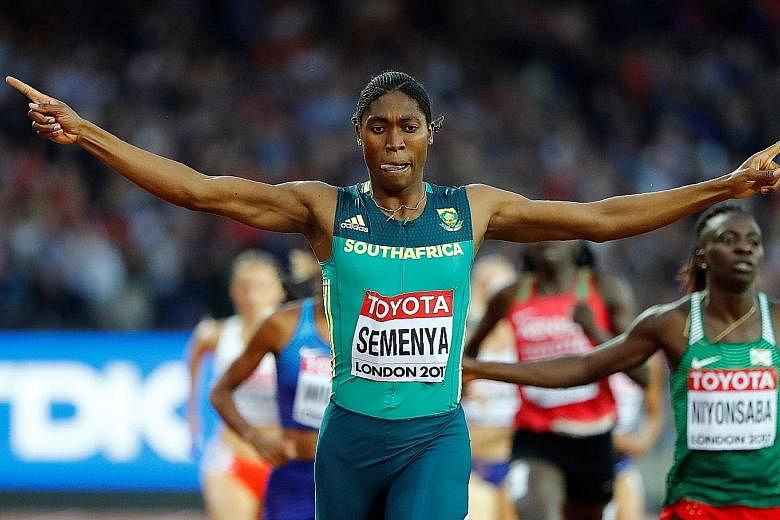NEW YORK • A landmark ruling from the highest legal authority in sport, that female track athletes with naturally elevated levels of testosterone must suppress their hormone to run in certain races, has caused other sports to scramble to digest the implications.
"This opens Pandora's box," said Tom Virgets, executive director of the International Boxing Association, 24 hours following a decision that is likely to have major implications on elite women's sports well beyond track and field.
The Switzerland-based Court of Arbitration for Sport ruled on inter-sex athletes after a decade of heated debate and litigation, but Wednesday's ruling may serve only to spark further debate rather than provide a final answer.
The subject, as controversial as it is emotive, has divided opinion across the spectrum, including within the court, which ruled 2-1 against Caster Semenya.
South Africa's two-time Olympic 800m champion had challenged the restrictions drawn up by the International Association of Athletics Federations (IAAF), track and field's world governing body.
In its most literal sense, the judgment means some female athletes will no longer be considered as such for races from 400m to a mile unless they take measures to suppress testosterone production.
Semenya's lawyers have vowed to fight on and, while the fuzzy wording of the court's judgment adds a further layer of confusion to what is already complex terrain to navigate, sports that have so far watched from the sidelines may soon be forced to tackle the issue.
The court's decision could now pave the way for new complaints about unfair advantages and similar rules in other women's sports, such as weightlifting, boxing, wrestling, rugby and football, where speed and power can be crucial in determining athletic success.
Virgets said it is widely accepted that testosterone creates an unfair advantage for certain boxers, because it gives them additional strength and stamina, but researching and quantifying the advantage would require extensive testing.
"This is going to be debated for many, many years," he said.
Semenya's case required the court to weigh fair play on the sports field against the human rights of athletes like Semenya, a national hero in South Africa.
Many sports will likely now look to the International Olympic Committee (IOC) for leadership and a pathway through what is already a legal and ethical quagmire. However, there is no guarantee they will get that, given the IOC's penchant for deferring to sports federations in the most controversial matters.
The IOC demurred when the Russian doping scandal threatened to overwhelm the 2016 Rio de Janeiro Olympic Games, telling international federations to decide their own participation guidelines for Russian athletes.
"There's no political benefit for the IOC to weigh in at this point," said Roger Pielke Jr, the director of the Sports Governance Centre at the University of Colorado, a member of Semenya's legal team.
In a statement, the IOC said it was working with a group of experts to create guidelines that would assist international federations to shape specific policies for their own sports "in relation to fairness, safety, inclusivity and non-discrimination on the basis of gender identity and sex characteristics".
The court judgment, according to Pielke, essentially gives sports federations the green light to act as they wish over the issue. He noted that IAAF president Sebastian Coe ignored a suggestion in the ruling that restrictions to 1,500m and mile races be delayed until more evidence is available.
Pielke added: "They don't necessarily need a strong evidence base to act."
Still, given the sensitivities related to the matter, many federations remain reluctant to discuss it in detail publicly. For example, there is little known about the findings made so far by a working group set up to examine the issue last year by volleyball's governing body FIVB. A spokesman said it was waiting to study the full details of the ruling in Semenya's case.
The organisation responsible for cycling said it had not yet considered specific eligibility rules for female athletes with elevated testosterone levels.
Some organisations referred to policies in place for athletes who have transitioned from male to female, showing that in certain cases, even a basic understanding of the inter-sex athlete remains elusive.
Virgets, the boxing leader, said he is unsure of what the changes could mean for women's boxing, adding that only one thing is certain - continuing debate and litigation.
"There are a bunch of lawyers who are going to become specialist litigators in this area and are going to make a lot of money," he said.
NYTIMES

